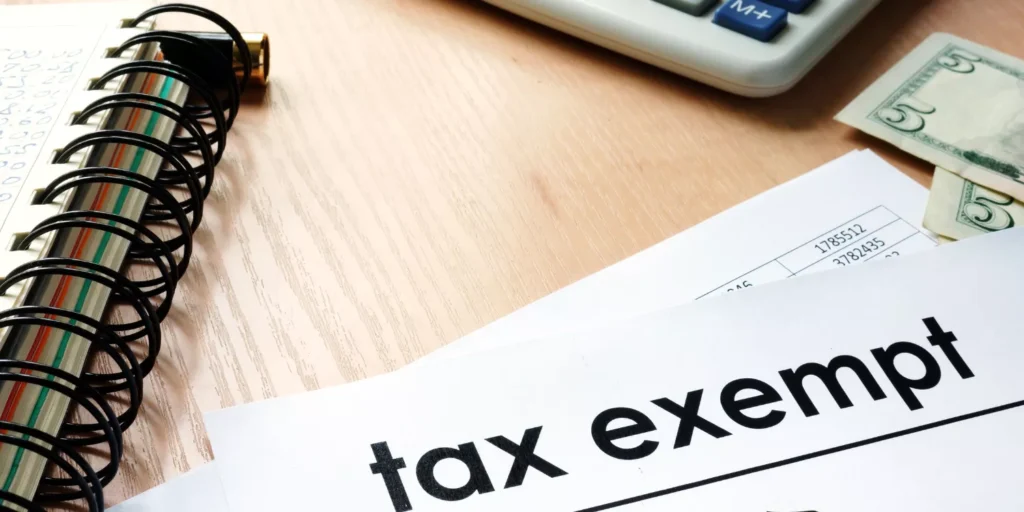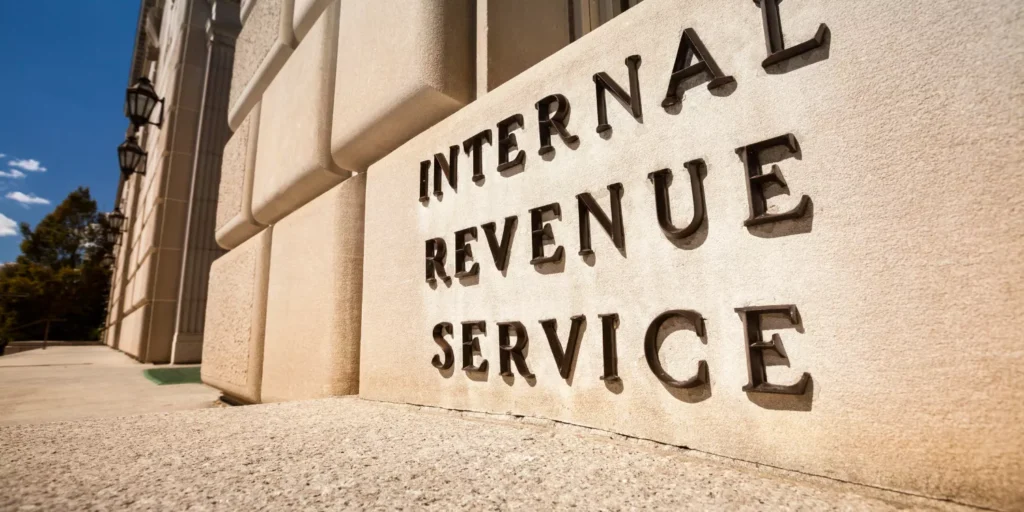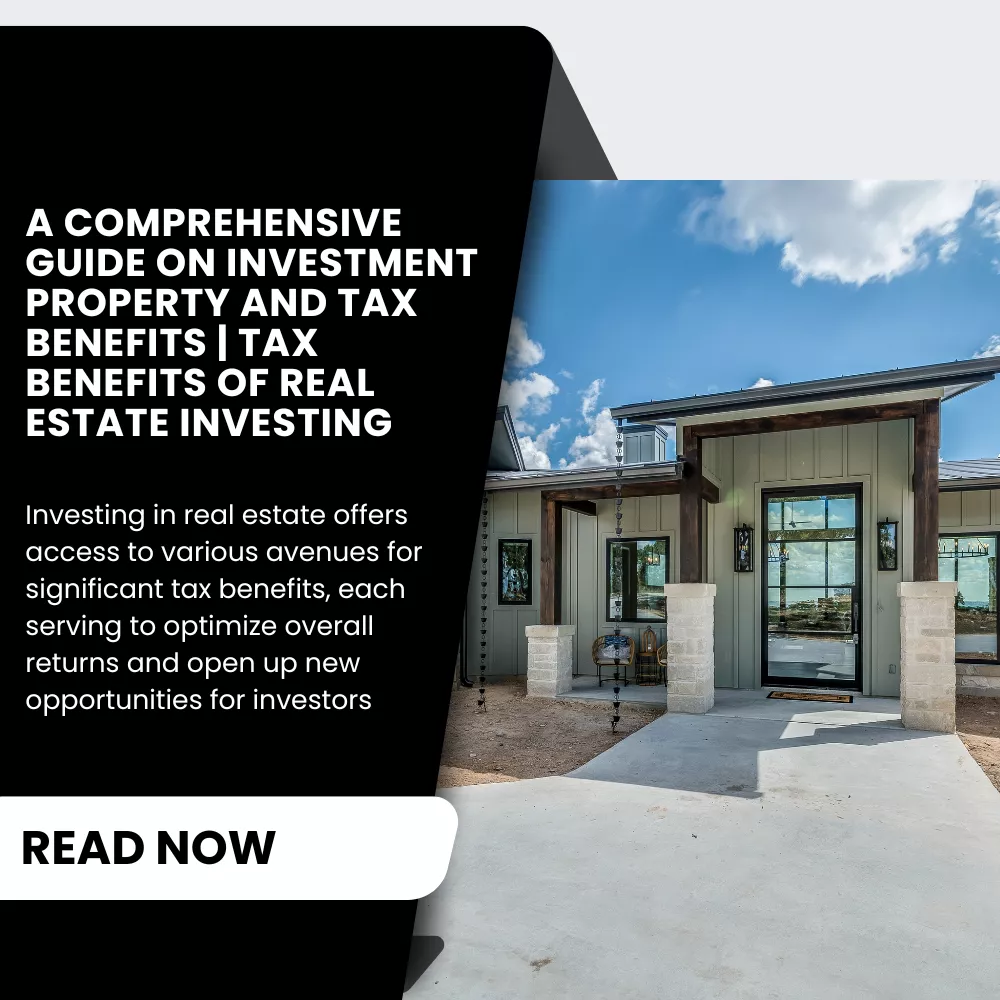Are you troubled regarding paying the taxes on any of your real estate investment properties? Fret not, because investing in real estate comes with many tax benefits. This article will cover everything important related to investment property and tax benefits. Let us begin:
Investment Property and Tax Benefits: Understanding the Tax Benefits of Investing in Real Estate
Investing in real estate opens up numerous doors which lead to major real estate tax benefits, each of which can maximize overall returns. Investors get the chance to deduct real estate taxes or property taxes, interest earned due to mortgage, insurance, as well as expenses related to maintenance from their income which is taxable.
Such deductions for rental properties minimize the total amount which is subject to taxes, thereby directly having an impact in a positive way on the bottom line of an investor. In addition, qualified real estate business expenditures such as costs related to advertising, legal fees, and the expenses related to travel for the management of the rental property also become deductible. The extensive range of write-offs make sure that investors are able to keep a larger amount from their rental income.
Capital gains tax also becomes highly relevant when it comes to selling an investment property for making profits. Moreover, tactics like depreciation facilitate investors to spread property prices over multiple years, thereby minimizing yearly taxable income besides dropping them into a comparatively lower tax bracket.
With options such as pass-through tax deductions providing investment property tax deduction percentages up to 20% on specific qualified business-based income from a rental property as well as tax incentives like 1031 exchanges, opportunity zones for the deferral or reduction of taxes furthermore, investments in the realm of real estate truly stand out due to their beneficial fiscal treatment as per the current tax laws.
Primary Tax Advantages of Owning a Rental Property
Deduction of Operating Expenses
Individuals who invest in real estate possess the benefit of minimizing their taxable income via the deduction of operating expenses. This includes costs such as property-based taxes as well as insurance, interest on mortgage, fees related to property management, and building maintenance.
Every year, these kinds of operating expenses can majorly reduce the amount of the income from rent of an individual which is subject to taxes. As an investors, you can thoroughly track all types of related expenses annually to ensure maximizing the benefits and reducing your tax burden.
Deduction of Mortgage Interest
Owning rental property offers major tax breaks with deductions on the mortgage interest. As an owners of properties, you can reduce your tax obligations or achieve tax write-offs, since you have the option to subtract the amount of interest paid on the property loan directly from your income which is taxable. This reduces your tax liability.
This significant benefit applies to both the primary loan as well as the loans which are taken later for the purpose of improving rental properties. Careful recordkeeping ensures that investors are able to precisely report all the deductions when tax filing, i.e., filing for IRS tax returns. By minimizing the amount of income taxable via this tactic, investors in the real estate sector increase their investments’ profitability margin without ignoring federal tax necessities.
Depreciation Deduction
Deduction of depreciation facilitates investors to minimize their taxable income with the help of accounting for the evental wear and tear of the property. This specific deduction, excluding land, takes into consideration the property’s cost basis, spread over its official useful life, which is 27.5 years when it comes to residential properties and 39 years when it comes to commercial real estate properties.
Investors calculate the annual depreciation expense, followed by deducting it from their official income from rent, thereby effectively reducing their tax bill. This tax tactic proves advantageous to those holding rental as well as commercial properties by identifying that the assets depreciate with the passage of time, impacting their overall market value along with their operational utility.
Deferral of Capital Gains Tax
This tactic facilitates owners of properties to postpone when it comes to paying taxes on the profits earned through the sale of a property if they decide to re-invest the amount into a different investment property. The 1031 exchange, which is a major tool in this entire process, allows real estate investors to replace one property for investing in another rental property of a similar kind without facing immediate tax consequences.
This specific deferral strategy is not only about dealing with the payment of taxes; it allows individuals to maximize their investments significantly over time. For those people putting their money in opportunity zones, this tactic brings in more advantages of investing in real estate.
Not only do they get the freedom to defer capital gains until the year 2026 by taking part in these programs, but sticking to an investment for more than a decade might completely exempt them from paying capital gains taxes completely on the profits they earn in the future which are derived from that specific investment.
Owner Expenses Deduction
Owners of rental property can subtract a lot of expenses which they incur because of their taxes, offering them major financial relief. Moreover, owners have the freedom to write off taxes on property, mortgage interest, as well as insurance premiums which are related with their rented properties.
They also enjoy the option to cut any cost which is associated with fees related to property management as well as repairs and routine maintenance which keep the health of the property intact. Advertising costs of the rental property, traveling from to to the property for business-related purposes, and fees for legalities involved in the process of renting or maintaining the rental property can also be deducted.
Self-Employment FICA Tax Exemption

Rental property owners can also get significant tax benefits, especially this one is particular: they are free from the obligation of paying FICA taxes which are due on their rental income. This offers major relief since FICA includes taxes related to Social Security as well as Medicare, both of whose payments are necessary for earned income.
Given the fact that the IRS does not list income under the earned income category, i.e., rental property is not classified under the category of earned income, it gets exempted from the regular FICA charged on both employees as well as self-employed earnings. For those individuals who manage all of their properties directly or with the help of LLC, this means that a higher amount of money stays in their pockets instead of getting used towards payroll taxes. This kind of deduction offers a big difference due to minimizing the overall amount of the federal income tax owed. To become eligible for this kind of deduction, owners of property must necessarily meet specific criteria set forth by the IRS.
Qualification for Pass-Through Qualification
Investors in the real estate sector who manage multiple rental properties with the help of pass-through entities such as LLCs, S Corps, as well as sole proprietorships have the green light to qualify for a variety of tax benefits. The IRS permits the tax-paying individuals to subtract up to a significant 20% of their QBI (Qualified Business Income) directly from their overall taxable income.
This makes a major difference by minimizing the total amount of owed federal income tax. To become eligible for this variety of deduction, owners of properties must meet all the required criteria established by the IRS. The regulations clearly state that businesses whose income is directly related to rent-based activities qualify.
Deeper Dive into the Primary Tax Benefits
Depreciations Costs Over Time
Real estate investors can cut costs of depreciation directly from their income which is taxable, making it an important tax benefit of being an owner of investment property. The IRS permits owners to calculate their depreciation expenses using the MACRS (Modified Accelerated Cost Recovery System).
This system offers a new method for the recovery of investments in specific property via yearly deductions. As properties undergo depreciation economically as well as age, leveraging such deductions turns into an integral part of enhancing ROI.
Capital Gains: Short-Term & Long-Term
Selling off a property for a higher amount that what an individual paid for it leads to capital gain, needing you to pay profit-based taxes. Short-term capital gains are applicable to properties which are sold within one year from the date of purchase. Moreover, they are taxed as regular income.
Long-term gains, on the other hand, concern only those assets which are held for more than 12 months. As compared to short-term gains, this kind of profit enjoys lower rates of taxes. Moreover, these offer massive tax savings, which is another factor that makes it a captivating aspect related investing in rental properties.
Leveraging 1031 Exchange for Tax Deferral
The popular 1031 Exchange functions as a powerful tool for individuals targeting to defer capital gains tax. This procedure facilitates investors to sell the property and re-invest the amount into a different property of equal or bigger value without needing to instantly pay taxes on any of the realized gains.
It is a serious approach for those who are on the lookout to enhance their investment portfolio, all while postponing their tax liabilities. Investors utilize this both as a deferral as well as an effective tactic within their own portfolio to reposition assets. However, it is important to note that certain regulations govern these transactions, which is why careful planning along with consulting a real estate professional as well as a tax professional is highly advised.
How Is Rental Income Taxed?

Rental incomes are taxes similar to common taxable incomes, i.e., they get added to other income sources an individual has and are taxed at their personal tax rate. Individuals are advised to report all kinds of rental income on their tax returns with the help of IRS Schedule E.
It is a form which facilitates listing a property’s rental income as well as deductible expenses like mortgage interest, taxes on property, operational costs, and depreciation. The primary target is to offset the income from rent with the help of these deductions in order to lower the amount taxable. Moreover, using this enables qualified landlords to cut up to a significant 20% of their overall profits from rental businesses before that specific income gets taxed.
The Vitality of Record Keeping for Compliance with IRS Compliance
Storing precise records and saving every receipt which is related to an investment property plays a crucial role in terms of IRS compliance. This comprehensive documentation supports all the expenses one gets on their tax returns, which are virtual for proving the claims in the case the IRS decides to perform an audit.
Without proper record-storing, investors might face issues when trying to prove that they are eligible for numerous deductions like depreciation recapture, mortgage interest on homes, as well as repairs vs. upgrades. Investors are also required to maintain detailed records related to repairs, maintenance activities, and their continuous involvement in the management of the property to comply with the regulations set forth by the IRS.
Rental Property-Specific Tax Deductions
Expenses Paid by Tenants
Tenant-paid expenses provide a chance for owners of rental property to minimize costs like property-based taxes, building maintenance tasks, property insurance, etc., directly from their income which is subject to taxation. Tenants add to these cuts indirectly via rent payments. This particular arrangement facilitates landlords to minimize their tax liability with ease.
Storing accurate records of expenditure which tenants pay is important. Proper documentation makes sure that on the IRS’s tax form, owners of properties have the option to claim every eligible deduction.
Trade for Services
Owners of rental properties can cut trade for services like an expense on their respective taxes. This specific arrangement includes tenants offering services in return for rent. This IRS needs the fair value in the market of the provided services to be officially reported as income.
However, the same amount also qualifies for cuts as an expense. Property owners must make sure that they correctly report the actual market value of every service which is exchanged. A failure to do so may lead to complexities with the IRS. Documentation is essential for proving the authenticity of the exchanges.
Security Deposits
Landlords collect security deposits in order to cover up any potential issue or damage caused by the tenants. If the property remains in a good condition, landlords are obligated to return the deposit at the lease’s end, turning it non-taxable initially. However, if portions of the deposit are retained for repairing damages which go way beyond regular wear and tear, those funds turn into taxable income.
Owners of properties also require tactics for correctly managing security deposits as per IRS rules. Missteps can lead towards complexities related to income on which tax is chargeable as well as deductions connected with property maintenance as well as operational costs.
Understanding What Non-Deductible Expenses Are
Personal Expenses

Personal expenses which are related to an individual’s investment property might trick them into thinking that they can be cut, but sadly, the IRS established clear boundaries. For example, although homeowner association charges are actual costs for numerous properties, if those charges are charged for not following specific rules or regulations, the IRS does not permit them as deductions. This means remaining within the established guidelines and laws is not merely good practice; it is important for enhancing tax benefits.
Repairs vs. Upgrades
Understanding what the differences are between repairs and upgrades is very important, especially for owners of investment properties, when it comes to tax benefits. Repairs make sure that a property remains in good condition. However, they do not add any major value or enhance its life.
Repairs may include fixing of leaks, painting walls, replacing windows which are broken. The IRS permits individuals to subtract the said costs in the year, primarily because they are important for the maintenance of the property’s current condition.
On the other hand, upgrades increase the value of a property along with its efficiency and longevity. This may include the addition of a new roof, upgrading the property’s HVAC system, or completely renovating shabby bathrooms or kitchens, etc. Even though these upgrades enhance the rental income in addition to the property value as time passes, the incurred costs are not instantly deductible.
Costs During Vacancy
Being an owner of rental property includes numerous costs, and these expenditures do not cease to exist when the property gets vacated. Landlords are still obligated to pay for basic utilities, maintenance, insurance, as well as mortgage payments without rental income of any sort to offset the costs.
During the periods of vacancy, landlords cannot subtract from their taxes the lost rental income. Attempts to fill up a vacant property quickly may lead to additional expenses for advertisements and possibly new property upgrades or renovation to appeal to potential tenants. Despite such efforts being mandatory for the generation of future income, they are representatives of out-of-pocket expenses which owners need to manage smartly during vacancies.
Final Thoughts
Investment properties in the world of real estate provide a direct pathway for the reduction of income on which tax is applicable with the help of numerous deductions as well as tax benefits. With numerous options readily available like depreciation, mortgage interest, operational expenses’ reduction, and so on, investors can massively minimize their yearly tax bill.
The 1031 exchange as well as opportunity zones also provide chances for deferral. Moreover, they also provide the opportunity for avoiding some kinds of long-term capital gains taxes. Keeping precise records makes sure that investors are able to completely leverage these advantages without breaking compliance with regulations set by the IRS.
Exploring the said benefits makes the real estate sector an appealing option for increasing one’s investment portfolio using tax-efficient tactics and strategies when it comes to any type of real estate investment.




